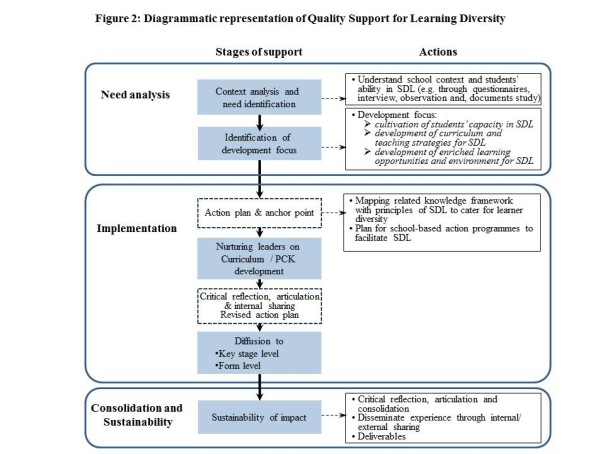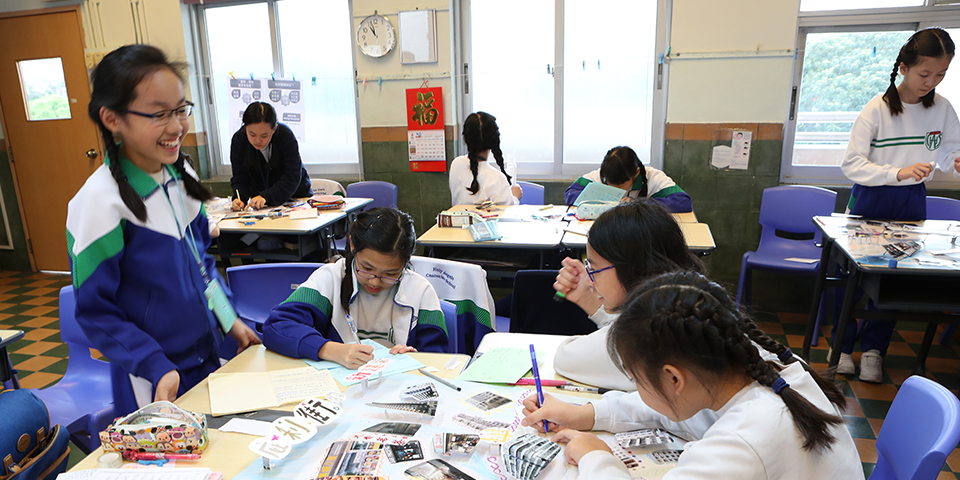QSIP: A Whole School Approach to Implementing Self-Directed Learning as a Strategy to Cater for Learner Diversity (2014 – 2017)
The Quality School Improvement Project: A Whole School Approach to Implementing Self-Directed Learning as a Strategy to Cater for Learner Diversity (QSIP-SDL) is an extension of the Quality School Improvement Project (QSIP). It adopts a comprehensive, interactive and organic approach under QSIP’s values and support modes to assist schools to cater for students’ learning diversity. Officially launched in 2014, the project began to provide professional support progressively to 80 local primary and secondary schools over the course of three years.
‘Self-directed learning’ (SDL) can be understood as objectives of achieving ‘effective learning’, ‘catering for learner diversity’, making students like to learn and be able to learn. And a set of so-called “SDL pedagogy” doesn't exist. One of the strategies to cater for learner diversity is the SDL promotion among students and the encouragement of passionate learning cultures.
Support features
In this project, we concentrate on SDL promotion on a whole-school basis, which we follow SDL principle and help schools to empower learning efficiency for students comprehensively. We also pick out and design focused strategies (such as for particular subject/form/class) for the comprehensive development based on teachers’ ideas on SDL and their consensus.

Support Target and Duration
The current project is a voluntary and collaborative partnership scheme with sufficient flexibility. It aims at serving higher primary school and junior secondary school students. Each participating school will receive support for 1 year.
Project support modes
As schools have different visions and missions, team culture, teaching philosophies, teachers’ power, students' level of attainment and learning characteristics, we would cater each school as an individual case and outline the improvement pathways through conducting interviews and class observations. We work hand-in-hand with the core task forces from our subject schools and set up initiatives to provide support of different modes and degrees in accordance with different needs and development strategies.
Inspired by the core values in QSIP, the team provides macro support ('Big wheel') and micro support ('Small wheel') in this project. 'Big wheel' generates to clarify stakeholders’ conceptual misunderstandings on ‘self-directed learning’ and 'catering for learner diversity' to reach a consensus within the campus for further developments. And 'Small wheel', on the other hand, operates to choose focused initiatives for schools according to the needs and development preferences. The objectives are to help schools to initiate or improve curriculum, to encourage ‘self-directed learning’ on the teaching level, to experiment different approaches in catering for learning diversity and to enhance teaching and leadership competence.
Our project upholds the flexibility and the complimentary coordination among the 'macro' and 'micro' supports and we look forward to seer greater effects with sustainability from our various measures. As mentioned previously, the support of our project is comprehensive, interactive and organic. There are various forms of support, including school-based assistance (e.g. professional workshops for teachers, joint preparation for lessons, class observations and evaluations, and school-based strategic planning) as well as cross-schools exchange network (e.g. cross-schools learning circles, joint-schools staff development day).
![]() Mode of Support
Mode of Support

Strategies for Promoting Self-directed Learning
Thanks to the support of local schools, the 3-year-long project QSIP-SDL has been completed fruitfully with the aims of promoting self-directed learning through partnering with 80 primary and secondary schools. The experiences gained would provide good references to schools and teachers. To pay them forward and sustain the impacts of the project, worked examples have been uploaded to our webpage (Chinese only).
| List of Participating Schools(2016-2017) | |
| Primary School | Secondary School |
|
|
| List of Participating Schools(2015-2016) | |
| Primary School | Secondary School |
|
|
| List of Participating Schools(2014-2015) | |
| Primary School | Secondary School |
|
|




